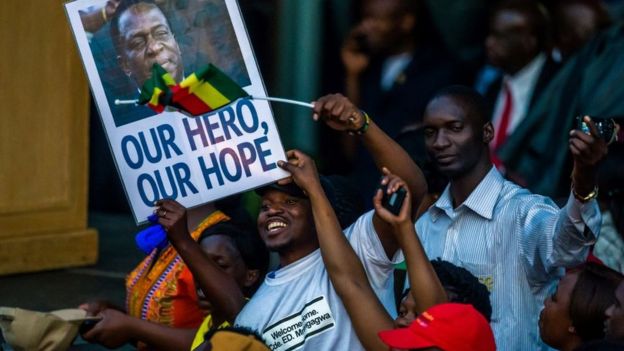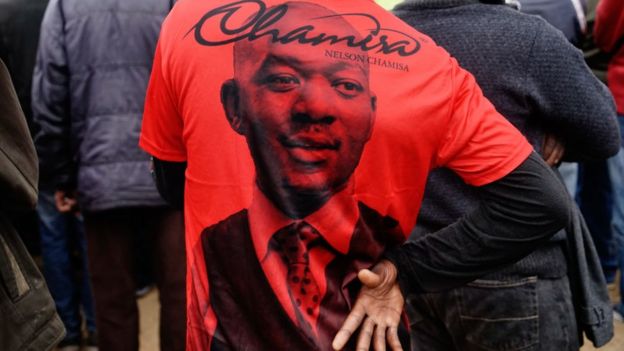
Zimbabwe's election campaign has been marred by a growing number of reports of voter intimidation and threats of violence, a UN body has said.
This includes people being forced to attend rallies in rural areas, the UN human rights office said.
It did not blame any party, but the ruling Zanu-PF has been accused of violence in previous elections.
Monday's elections will be the first since long-serving ruler Robert Mugabe was forced to resign in November.
A survey published last week predicted a tight race between his successor, Emmerson Mnangagwa, and main opposition leader Nelson Chamisa.
The survey, by South Africa-based Afrobarometer, gave Mr Mnangagwa 40% of the vote and Mr Chamisa 37%, raising the possibility of a run-off.
In a statement, the UN human rights office said it welcomed the "widening of the democratic space" in Zimbabwe since Mr Mugabe's removal from office.
"We remain concerned, however, at the increasing number of reports, particularly in some rural areas, of voter intimidation, threats of violence, harassment and coercion, including people being forced to attend political rallies," it added.
Last month, a high court ordered Zanu-PF not to force schoolchildren and teachers to attend its rallies and to wear its regalia.
The case was brought by the Association of Rural Teachers Unions of Zimbabwe, which said it had acted to uphold the rule of law.

President Mnangagwa says the poll will be free and fair
The BBC's Shingai Nyoka reports from the capital, Harare, that the head of one village told her that he had been warned that the violence of previous elections would be repeated if he voted for the opposition.
However, it is unclear how widespread voter intimidation is, she adds.
Most voters in live in rural areas, where traditional rulers wield enormous influence.
Zanu-PF has not yet commented on the UN's statement.
At least two people were killed in an explosion at a Zanu-PF rally addressed by Mr Mnangagwa last month.
He said he suspected that a faction linked to former First Lady Grace Mugabe was behind the blast in an attempt to kill him.
Emmerson Mnangagwa, 75:
Nelson Chamisa, 40:

Opposition leader Nelson Chamisa hopes to win the youth vote
Mr Mnangagwa has repeatedly promised that the elections will be free and fair.
He has invited European Union and US observers to monitor the elections for the first time in 16 years.
Mr Mugabe had refused to allow them into the country.
The military has also promised to remain neutral, in a departure from previous elections when its senior commanders said they would reject an opposition victory.
Zimbabweans will vote in presidential, parliamentary and local elections.
More than 120 parties have registered to contest the elections, and there are 23 presidential candidates.
The youth vote is expected to be key. More than half of Zimbabweans are now under 25 and about 43.5% of registered voters are under 35.